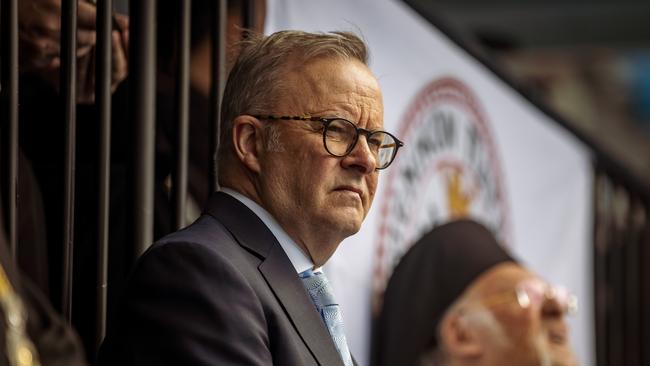Since the so-called “loopholes” industrial relations legislation was first proposed well over a year ago, I have been describing the consequences of the government’s 700-page business blueprint crafted by Anthony Albanese and Tony Burke.
But the corporate boards of Australia were virtually silent during the preliminary discussions, the parliamentary debate and the direct aftermath.
Indeed, back in November 2022 Tony Bourke actually praised the role of the Business Council, the small business body COSBOA and the Australian Chamber of Commerce and Industry for their role in the early discussions.
The failure of the small and large enterprise behind these bodies to realise what was about to happen played a significant role in the horror later created.

Big enterprises were far more interested in funding the ALP’s Yes vote campaign against the Coalition to enable Aboriginals and Torres Strait Islanders to have wide access to public service decision-making, even though the directors knew it would clog up our government.
Both Burke and the Prime Minister would have been well aware, once the loopholes' legislation was passed, that Australia’s corporate boards would wake up and demand action from the Coalition to fix the problems partly created by the companies themselves.
And Burke and Albanese could reasonably expect the Coalition, in “lapdog” fashion, to promise massive changes during the campaign leading up to the next election – well before the impact of the legislation would have been appreciated by the public.
During the next six months most unions will demonstrate pay benefits to the community and the ALP will be able to portray the Coalition as puppets of greedy bosses wanting to take away worker rights and benefits.
Business Council of Australia CEO Bran Black says the “pendulum” must be pushed back to ensure a balance between employer interests and union interests. Mr Black’s comments come after record numbers: 6600 insolvencies over the last six months, 1 per cent economic growth and productivity levels at decade lows.
“The reality is here that we’ve got to start looking at changes in industrial relations that are going to push the pendulum back in favour of just a more decent balance between employer interest and union interest,” Mr Black told Sky News Australia.
“That balance has gone way too far in line of union interests, and we’ve got to start pulling it back.”
Historically the Coalition has fallen for such traps, and Burke and Albanese must be confident it will happen again.
Indeed, there are early signs Ley and Cash are setting up policies which may make sense but can be construed as likely to reduce living standards of working Australians – before those Australians understand the adverse ramifications of the loopholes’ legislation.
With one exception, the measures in the industrial relations legislation cannot be politically changed until the community understands the damage they are creating.
What corporations need to do is to look back on their mistakes and the contribution they made to the final legislated outcome, and then begin the process of creating a community understanding.
Only when the community understands the ramifications to Australian productivity and standard of living can the Coalition begin to repair the damage.
When the companies look back at their past foolishness they will discover during the Morrison years the army of industrial relations lawyers and consultants were concerned that enterprise agreements – their skills base – were going into decline. They were appealing to both the ALP and the Coalition for reform.
It opened the door for Albanese and Burke when they gained power. Very quickly there was a skills summit and other conferences. The business organisations did not have a well-thought-out agenda.
It’s true, the legislation that came out of the summit and other preliminary discussions went far beyond anything the large and small corporates could have imagined.
But many large corporations were vulnerable because previous chief executives had skilfully de-unionised their enterprises to lift productivity, but had allowed a different pay structure to enter their workplaces where very productive labour-hire workers were often paid less than corporate employees and in some cases – like parts of the coal industry – they were paid less than the award.

The current crop of chief executives did not realise this gap might be used as a loophole to restore union control of major enterprises.
The industrial relations legislation has been set up to lower productivity and efficiency and will cause enormous damage to the Australian economy.
Companies need to take necessary steps to create community understanding of this damage before any opposition party can take up the cause.
But the Business Council, the Australian Chamber of Commerce and similar bodies now want the Coalition to change the definition of small business employment, the rights of unions to regain control via delegates, much higher transport costs and so on.
Of course, many large companies will simply take their cash and invest offshore.
When companies that want to expand in Australia explain to their workforces the damage created by the legislation, their major shareholders – the union-influenced industry funds – might not agree.
Australia is a leader in small shareholder communication, but our large companies have largely ignored the new systems developed by InvestorHub and others and concentrated on their large shareholders.
If these companies want to be part of the total community, then perhaps they might start with proper communications with smaller shareholders.
I make one caveat to the above. One part of the 700-page business blueprint/industrial relations legislation is an attack on casual employees and the 25 per cent cash premium they receive.
The unions want those people classified as employees, so they become members. The legislation defines a casual employee in such a complex way that any employer hiring casuals takes a huge risk.
It should be the only industrial relations focus of the Coalition in the election. Only when the community understands what has been done is it politically possible to repair the damage.






A carefully prepared trap has been set for Opposition Leader Peter Dutton, his deputy Sussan Ley and industrial relations spokeswoman Michaelia Cash. If they fall into this trap, it might cost them the 2025 election.